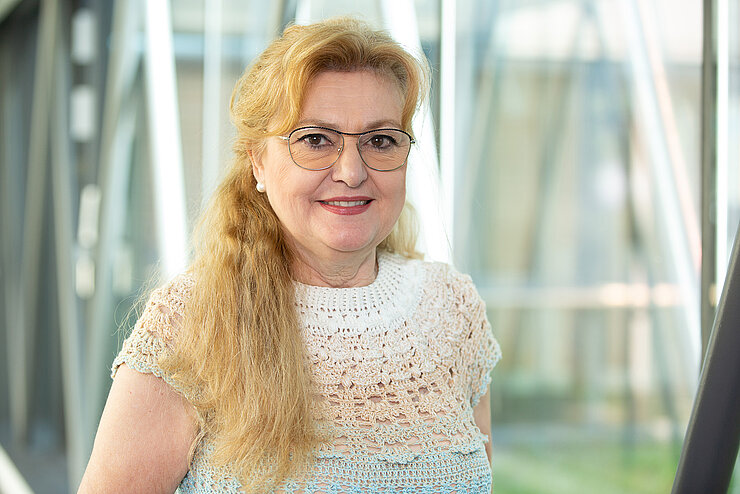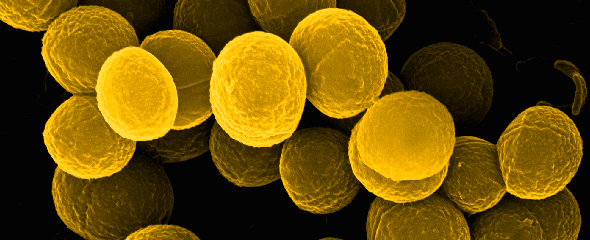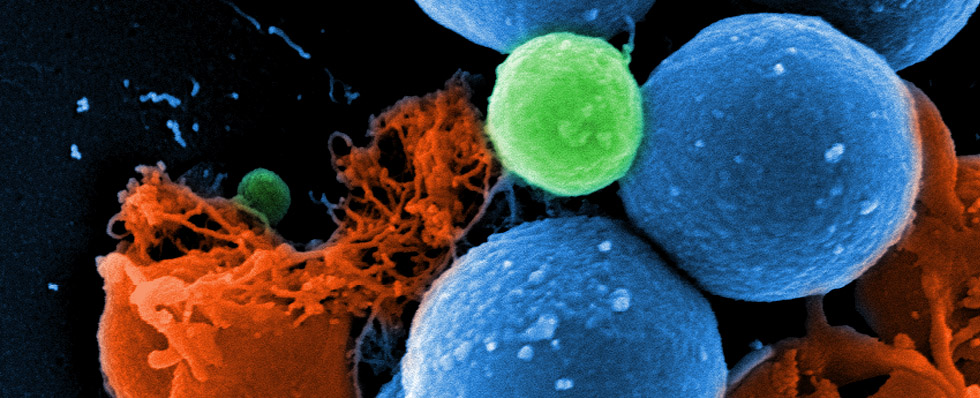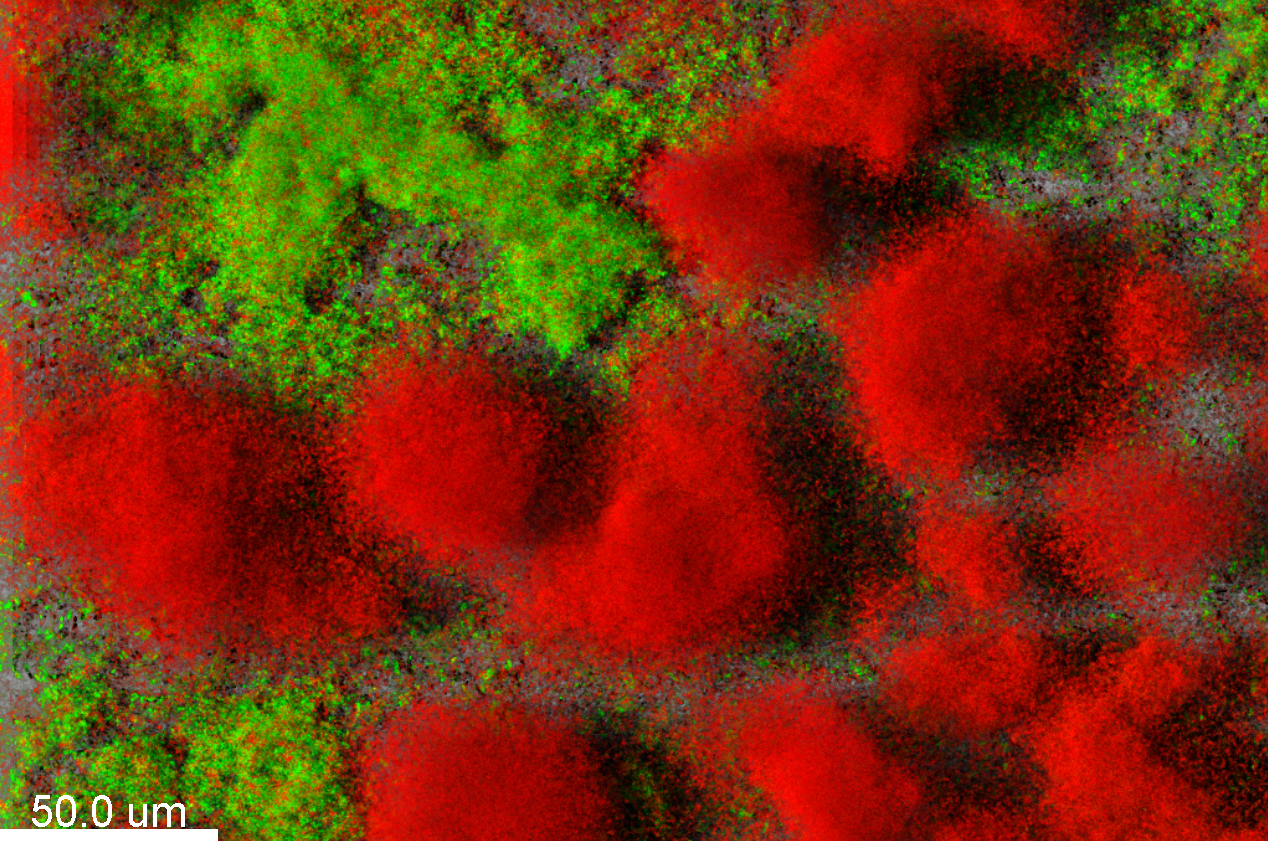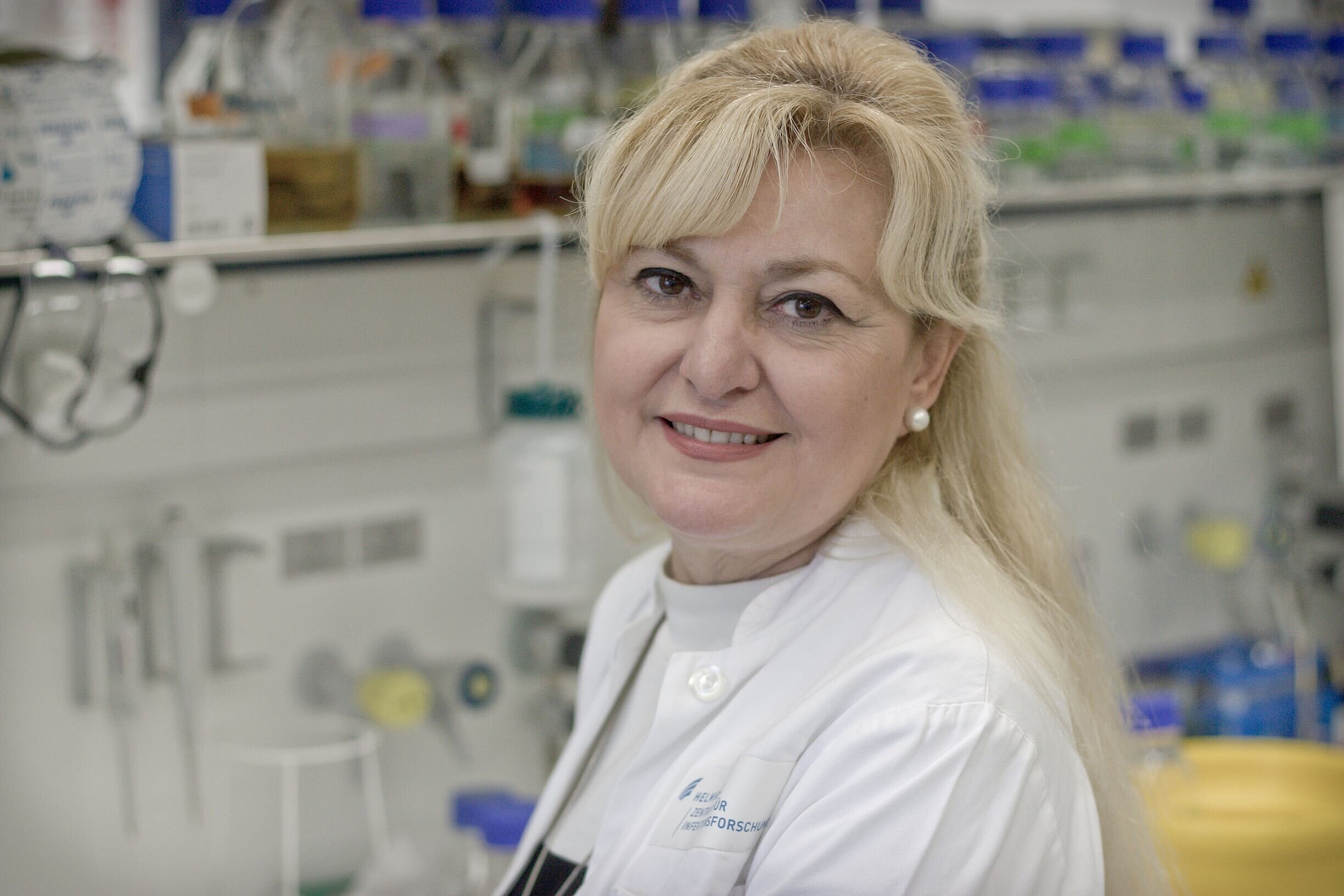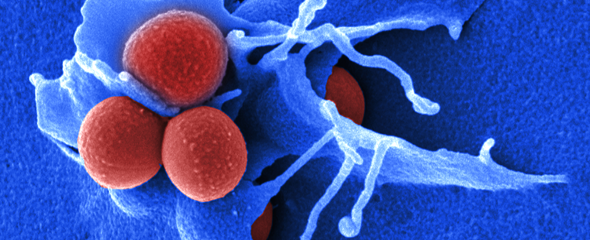Author count: 2
Rox K., Medina E.
(2024)
Aerosolized delivery of ESKAPE pathogens for murine pneumonia models
Scientific Reports, 14 (1)
Author count: 4
Goldmann O., Nwofor O.V., Chen Q., Medina E.
(2024)
Mechanisms underlying immunosuppression by regulatory cells
Front Immunol., 15
Author count: 9
Lapschies A.M., Aubry E., Kohler T.P., Goldmann O., Hammerschmidt S., Nerlich A., Eichhorn I., ... , van Vorst K., Fulde M.
(2023)
The type-2 Streptococcus canis M protein SCM-2 binds fibrinogen and facilitates antiphagocytic properties
Front.Microbiol., 14
Author count: 2
Goldmann O., Medina E.
(2023)
Myeloid-derived suppressor cells impair CD4+ T cell responses during chronic Staphylococcus aureus infection via lactate metabolism
Cell.Mol.Life Sci., 80 (8)
Author count: 8
Papaxenopoulou L.A., Zhao G., Khailaie S., Katsoulis-Dimitriou K., Schmitz I., Medina E., ... , Hatzikirou H., Meyer-Hermann M.
(2022)
In silico predicted therapy against chronic Staphylococcus aureus infection leads to bacterial clearance in vivo
iScience, 25 (12)
Author count: 9
Lang J.C., Seiß E.A., Moldovan A., Müsken M., Sauerwein T., Fraunholz M., Müller A.J., ... , Goldmann O., Medina E.
(2022)
A Photoconvertible Reporter System for Bacterial Metabolic Activity Reveals That Staphylococcus aureus Enters a Dormant-Like State to Persist within Macrophages
MBio.
Author count: 16
Heinz A., Nonnenmacher Y., Henne A., Khalil M.A., Bejkollari K., Dostert C., Hosseini S., Goldmann O., He W., Palorini R., Verschueren C., Korte M., Chiaradonna F., Medina E., ... , Brenner D., Hiller K.
(2022)
Itaconate controls its own synthesis via feedback-inhibition of reverse TCA cycle activity at IDH2
Biochim.Biophys.Acta Mol.Basis.Dis., 1868 (12)
Author count: 25
He W., Henne A., Lauterbach M., Geißmar E., Nikolka F., Kho C., Heinz A., Dostert C., Grusdat M., Cordes T., Härm J., Goldmann O., Ewen A., Verschueren C., Blay-Cadanet J., Geffers R., Garritsen H., Kneiling M., Holm C.K., Metallo C.M., Medina E., Abdullah Z., Latz E., ... , Brenner D., Hiller K.
(2022)
Mesaconate is synthesized from itaconate and exerts immunomodulatory effects in macrophages
Nat.Metab, 4 (5)
Author count: 6
Goldmann O., Sauerwein T., Molinari G., Rohde M., Förstner K.U., Medina E.
(2022)
Cytosolic Sensing of Intracellular Staphylococcus aureus by Mast Cells Elicits a Type I IFN Response That Enhances Cell-Autonomous Immunity
J Immunol, 208 (7)
Author count: 3
Junca H., Pieper D.H., Medina E.
(2022)
The emerging potential of microbiome transplantation on human health interventions
Comput.Struct.Biotechnol.J., 20 (January 2022)
Author count: 8
Dietrich O., Heinz A., Goldmann O., Geffers R., Beineke A., Hiller K., ... , Saliba A.E., Medina E.
(2021)
Dysregulated Immunometabolism Is Associated with the Generation of Myeloid-Derived Suppressor Cells in Staphylococcus aureus Chronic Infection
J.Innate.Immun.
Author count: 8
Groma M., Horst S.A., Das S., Huettel B., Klepsch M., Rudel T., ... , Medina E., Fraunholz M.
(2020)
Identification of a Novel LysR-Type Transcriptional Regulator in Staphylococcus aureus That Is Crucial for Secondary Tissue Colonization during Metastatic Bloodstream Infection
MBio., 11 (4)
Author count: 21
Le P., Kunold E., Macsics R., Rox K., Jennings M.C., Ugur I., Reinecke M., Chaves-Moreno D., Hackl M.W., Fetzer C., Mandl F.A.M., Lehmann J., Korotkov V.S., Hacker S.M., Kuster B., Antes I., Pieper D.H., Rohde M., Wuest W.M., ... , Medina E., Sieber S.A.
(2020)
Repurposing human kinase inhibitors to create an antibiotic active against drug-resistant Staphylococcus aureus, persisters and biofilms
Nat.Chem., 12 (2)
Author count: 7
Goldmann O., Cern A., Müsken M., Rohde M., Weiss W., ... , Barenholz Y., Medina E.
(2019)
Liposomal mupirocin holds promise for systemic treatment of invasive Staphylococcus aureus infections
J.Control Release, 316
Author count: 11
Thänert R., Itzek A., Hossmann J., Hamisch D., Madsen M.B., Hyldegaard O., Skrede S., Bruun T., Norrby-Teglund A., ... , Medina E., Pieper D.H.
(2019)
Molecular profiling of tissue biopsies reveals unique signatures associated with streptococcal necrotizing soft tissue infections
Nat.Commun., 10 (1)
Author count: 12
Zhao W., Cross A.R., Crowe-McAuliffe C., Weigert-Munoz A., Csatary E.E., Solinski A.E., Krysiak J., Goldberg J.B., Wilson D.N., Medina E., ... , Wuest W.M., Sieber S.A.
(2019)
The Natural Product Elegaphenone Potentiates Antibiotic Effects against Pseudomonas aeruginosa
Angew.Chem.Int.Ed., 58 (25)
Author count: 8
Seiß E.A., Krone A., Formaglio P., Goldmann O., Engelmann S., Schraven B., ... , Medina E., Müller A.J.
(2019)
Longitudinal proliferation mapping in vivo reveals NADPH oxidase-mediated dampening of Staphylococcus aureus growth rates within neutrophils
Sci.Rep., 9 (1)
Author count: 12
Nerlich A., Lapschies A.M., Kohler T.P., Cornax I., Eichhorn I., Goldmann O., Krienke P., Bergmann S., Nizet V., Hammerschmidt S., ... , Rohde M., Fulde M.
(2019)
Homophilic protein interactions facilitate bacterial aggregation and IgG-dependent complex formation by the Streptococcus canis M protein SCM
Virulence., 10 (1)
Author count: 24
Jayachandran R., Gumienny A., Bolinger B., Ruehl S., Lang M.J., Fucile G., Mazumder S., Tchang V., Woischnig A.K., Stiess M., Kunz G., Claudi B., Schmaler M., Siegmund K., Li J., Dertschnig S., Holländer G., Medina E., Karrer U., Moshous D., Bumann D., Khanna N., ... , Rossi S.W., Pieters J.
(2019)
Disruption of Coronin 1 Signaling in T Cells Promotes Allograft Tolerance while Maintaining Anti-Pathogen Immunity
Immunity., 50 (1)
Author count: 8
Neumeier B.L., Khorenko M., Alves F., Goldmann O., Napp J., Schepers U., ... , Reichardt H.M., Feldmann C.
(2019)
Fluorescent Inorganic-Organic Hybrid Nanoparticles
ChemNanoMat., 5 (1)
Author count: 8
Heck J.G., Rox K., Lünsdorf H., Lückerath T., Klaassen N., Medina E., ... , Goldmann O., Feldmann C.
(2018)
Zirconyl Clindamycinphosphate Antibiotic Nanocarriers for Targeting Intracellular Persisting Staphylococcus aureus
ACS Omega, 3 (8)
Author count: 2
Medina E., Hartl D.
(2018)
Myeloid-Derived Suppressor Cells in Infection: A General Overview
J.Innate.Immun., 10 (5-6)
Author count: 5
Strehlitz A., Goldmann O., Pils M.C., Pessler F., Medina E.
(2018)
An interferon signature discriminates pneumococcal from staphylococcal pneumonia
Front.Immunol., 9 (JUN)
Author count: 4
Ferrer-Navarro M., Strehlitz A., Medina E., Vila J.
(2018)
Changed expression of cytoskeleton proteins during lung injury in a mouse model of Streptococcus pneumoniae infection
Front.Microbiol., 9 (MAY)
Author count: 10
Koymans K.J., Goldmann O., Karlsson C.A.Q., Sital W., Bisschop A., Vrieling M., Malmstr÷m J., van Kessel K.P.M., ... , De Haas C.J.C., Van Strijp J.A.G.
(2017)
The TLR2 Antagonist Staphylococcal Superantigen-Like Protein 3 Acts as a Virulence Factor to Promote Bacterial Pathogenicity in vivo
J.Innate Immun., 9 (6)
Author count: 6
Fetzer C., Korotkov V.S., Lee K.M., Neuenschwander M., von Kries J.P., Medina E.
(2017)
A Chemical Disruptor of the ClpX Chaperone Complex Attenuates the Virulence of Multidrug-Resistant Staphylococcus aureus
Angew.Chem.Int.Ed., 56 (49)
Author count: 3
Goldmann O., Beineke A., Medina E.
(2017)
Identification of a novel subset of myeloid-derived suppressor cells during chronic staphylococcal infection that resembles immature eosinophils
J.Infect.Dis., 216 (11)
Author count: 2
Goldmann O., Medina E.
(2017)
Staphylococcus aureus strategies to evade the host acquired immune response
Int.J.Med.Microbiol. (9)
Author count: 5
Blaschke U., Beineke A., Klemens J., Medina E., Goldmann O.
(2017)
Induction of Cyclooxygenase 2 by Streptococcus pyogenes Is Mediated by Cytolysins
J.Innate.Immun., 9 (6)
Author count: 5
Leech J.M., Lacey K.A., Mulcahy M.E., Medina E., McLoughlin R.M.
(2017)
IL-10 plays opposing roles during staphylococcus aureus systemic and localized infections
J.Immunol., 198 (6)
Author count: 4
Thänert R., Goldmann O., Beineke A., Medina E.
(2017)
Host-inherent variability influences the transcriptional response of Staphylococcus aureus during in vivo infection
Nat.Commun., 8
Author count: 7
Deicke C., Chakrakodi B., Pils M.C., Dickneite G., Johansson L., ... , Medina E., Loof T.G.
(2016)
Local activation of coagulation factor XIII reduces systemic complications and improves the survival of mice after Streptococcus pyogenes M1 skin infection
Int.J Med.Microbiol., 306 (7)
Author count: 6
Chaves-Moreno D., Wos-Oxley M.L., Jauregui R., Medina E., Oxley A.P., Pieper D.H.
(2016)
Exploring the transcriptome of Staphylococcus aureus in its natural niche
Sci Rep., 6
Author count: 2
Medina E., Pieper D.H.
(2016)
Tackling Threats and Future Problems of Multidrug-Resistant Bacteria
Curr Top.Microbiol.Immunol., 398
Author count: 1
Medina E.
(2006)
Streptococcus pyogenes and host'genetics
Mod.Asp.Immunobiol., 18
Author count: 4
Ruiz-Cruz S., Espinosa M., Goldmann O., Bravo A.
(2015)
Global Regulation of Gene Expression by the MafR Protein of Enterococcus faecalis
Front Microbiol., 6
Author count: 6
Chaves-Moreno D., Wos-Oxley M.L., Jauregui R., Medina E., Oxley A.P., Pieper D.H.
(2015)
Application of a Novel "Pan-Genome"-Based Strategy for Assigning RNAseq Transcript Reads to Staphylococcus aureus Strains
PLoS ONE, 10 (12)
Author count: 14
Tuchscherr L., Kreis C.A., Hoerr V., Flint L., Hachmeister M., Geraci J., Bremer-Streck S., Kiehntopf M., Medina E., Kribus M., Raschke M., Pletz M., ... , Peters G., Loffler B.
(2015)
Staphylococcus aureus develops increased resistance to antibiotics by forming dynamic small colony variants during chronic osteomyelitis
J Antimicrob.Chemother., 71
Author count: 4
Goldmann O., Tuchscherr L., Rohde M., Medina E.
(2015)
alpha-hemolysin enhances Staphylococcus aureus internalization and survival within mast cells by modulating the expression of beta1 integrin
Cell Microbiol., 18 (6)
Author count: 9
Tsatsaronis J.A., Ly D., Pupovac A., Goldmann O., Rohde M., Taylor J.M., Walker M.J., ... , Medina E., Sanderson-Smith M.L.
(2015)
Group A Streptococcus Modulates Host Inflammation by Manipulating Polymorphonuclear Leukocyte Cell Death Responses
J.Innate Immun., 7 (6)
Author count: 5
Horst S.A., Itzek A., Klos A., Beineke A., Medina E.
(2015)
Differential Contributions of the Complement Anaphylotoxin Receptors C5aR1 and C5aR2 to the Early Innate Immune Response against Staphylococcus aureus Infection
Pathogens, 4 (4)
Author count: 13
Lau S.C.K., Riedel T., Fiebig A., Han J., Huntemann M., Petersen J., Ivanova N.N., Markowitz V., Woyke T., Göker M., Kyrpides N.C., ... , Klenk H.P., Qian P.Y.
(2015)
Genome sequence of the pink-pigmented marine bacterium Loktanella hongkongensis type strain (UST950701û009PT), a representative of the Roseobacter group
Stand.Genomic Sci., 10 (AUGUST2015)
Author count: 7
Fiebig A., Loof T.G., Babbar A., Itzek A., Koehorst J.J., ... , Schaap P.J., Nitsche-Schmitz D.P.
(2015)
Comparative Genomics of Streptococcus pyogenes M1 isolates differing in virulence and propensity to cause systemic infection in mice
Int.J.Med.Microbiol., 305 (6)
Author count: 20
Yuan D., Zhu Z., Tan X., Liang J., Zeng C., Zhang J., Chen J., Ma L., Dogan A., Brockmann G., Goldmann O., Medina E., Rice A.D., Moyer R.W., Man X., Yi K., Li Y., Lu Q., ... , Huang Y., Huang S.
(2014)
Scoring the collective effects of SNPs: association of minor alleles with complex traits in model organisms
Science China Life Sciences, 57
Author count: 9
Ben Hania W., Joseph M., Schumann P., Bunk B., Fiebig A., Sproer C., Klenk H.P., ... , Fardeau M.L., Spring S.
(2015)
Complete genome sequence and description of Salinispira pacifica gen. nov., sp. nov., a novel spirochaete isolated form a hypersaline microbial mat
Stand.Genomic Sci, 10
Author count: 7
Riedel T., Spring S., Fiebig A., Scheuner C., Petersen J., ... , Goker M., Klenk H.P.
(2015)
Genome sequence of the Roseovarius mucosus type strain (DSM 17069(T)), a bacteriochlorophyll a-containing representative of the marine Roseobacter group isolated from the dinoflagellate Alexandrium ostenfeldii
Stand.Genomic Sci, 10
Author count: 9
Loof T.G., Goldmann O., Naudin C., Mörgelin M., Neumann Y., Pils M.C., Foster S.J., ... , Medina E., Herwald H.
(2015)
Staphylococcus aureus-induced clotting of plasma is an immune evasion mechanism for persistence within the fibrin network
Microbiology, 161 (3)
Author count: 14
Szafranska A.K., Oxley A.P.A., Chaves-Moreno D., Horst S.A., Roßlenbroich S., Peters G., Goldmann O., Rohd M., Sinha B., Pieper D.H., Löffler B., Jauregui R., ... , Wos-Oxley M.L., Medina E.
(2014)
High-resolution transcriptomic analysis of the adaptive response of staphylococcus aureus during acute and chronic phases of osteomyelitis
MBio, 5 (6)
Author count: 7
Tebartz C., Horst Sarah A., Sparwasser Tim, Hühn Jochen, Beineke A., ... , Peters G., Medina Eva
(2014)
A Major Role for Myeloid-Derived Suppressor Cells and a Minor Role for Regulatory T Cells in Immunosuppression during Staphylococcus aureus Infection
Journal of Immunology, 194 (3)
Author count: 3
Loof Torsten G., Deicke Christin, Medina Eva
(2014)
The role of coagulation/fibrinolysis during Streptococcus pyogenes infection
Frontiers in Cellular and Infection Microbiology, 4
Author count: 11
Mehraj J., Akmatov M.K., Strömpl J., Gatzemeier A., Layer F., Werner G., Pieper D.H., Medina E., Witte W., ... , Pessler F., Krause G.
(2014)
Methicillin-Sensitive and Methicillin-Resistant Staphylococcus aureus Nasal Carriage in a Random Sample of Non-Hospitalized Adult Population in Northern Germany
PLoS ONE, 9 (9)
Author count: 4
Scheb-Wetzel M., Rohde M., Bravo A., Goldmann O.
(2014)
New insights into the antimicrobial effect of mast cells against Enterococcus faecalis
Infection and Immunity, 82 (11)
Author count: 9
Horst S.A., Linner A., Beineke A., Lehne S., Höltje C., Hecht A., Norrby-Teglund A., ... , Medina E., Goldmann O.
(2013)
Prognostic Value and Therapeutic Potential of TREM-1 in Streptococcus pyogenes- Induced Sepsis
Journal of Innate Immunology, 5 (6)
Author count: 10
Ko Y.P., Freitag C.M., Kuipers A., Jongerius I., Medina Eva, van Rooijen W.J., Spaan A.N., van Kessel K.P.M., ... , Höök M., Rooijkkers S.H.M.
(2013)
Phagocytosis escape by a bacterial protein that connects complement and coagulation proteins at the bacterial surface
PLoS Pathogens, 9 (12)
Author count: 5
Rosendahl A., Bergmann Silke, Hammerschmidt S., Goldmann O., Medina E.
(2013)
Lung dendritic cells facilitate extrapulmonary bacterial dissemination during pneumococcal pneumonia
Frontiers in Cellular and Infection Microbiology, 3
Author count: 15
Michelucci A., Cordes T., Ghelfi J., Pailot A., Reiling N., Goldmann O., Binz T., Wegner A., Tallam A., Rausell A., Buttini M., Linster C.L., Medina Eva, ... , Balling R., Hiller K.
(2013)
Immune-responsive gene 1 protein links metabolism to immunity by catalyzing itaconic acid production
Proceedings of the National Academy of Sciences USA, 110 (19)
Author count: 2
Goldmann O., Medina Eva*
(2012)
The expanding world of extracellular traps: not only neutrophils but much more
Frontiers in Immunology, 3
Author count: 8
Schindler D., Gutierrez Maximiliano G., Beineke A., Rauter Y., Rohde Manfred, Foster S., ... , Goldmann O., Medina Eva
(2012)
Dendritic Cells Are Central Coordinators of the Host Immune Response to Staphylococcus aureus
American Journal of Pathology, 181 (4)
Author count: 9
Niemann S., Ehrhardt C., Medina Eva*, Warnking K., Tuchscherr L., Heitmann V., Ludwig S., ... , Peters G., Loffler B.
(2012)
Combined Action of Influenza Virus and Staphylococcus aureus Panton-Valentine Leukocidin Provokes Severe Lung Epithelium Damage
Journal of Infectious Diseases, 206 (7)
Author count: 16
Horst S.A., Hoerr V., Beineke A., Kreis C., Tuchscherr L., Kalinka J., Lehne S., Schleicher I., Kohler G., Fuchs T., Raschke M.J., Rohde Manfred*, Peters G., Faber C., ... , Loffler B., Medina Eva*
(2012)
A Novel Mouse Model of Staphylococcus aureus Chronic Osteomyelitis That Closely Mimics the Human Infection: An Integrated View of Disease Pathogenesis
American Journal of Pathology, 181 (4)
Author count: 13
Wos-Oxley M., Bleich A., Oxley A.P., Kahl S., Janus L., Smoczek A., Nahrstedt H., Pils M., Taudien S., Platzer M., Hedrich H.J., ... , Medina Eva*, Pieper Dietmar*
(2012)
Comparative evaluation of establishing a human gut microbial community within rodent models
Gut Microbes, 3 (3)
Author count: 6
Ziegler C., Goldmann O., Hobeika E., Geffers Robert*, Peters G., Medina Eva*
(2011)
The dynamics of T cells during persistent Staphylococcus aureus infection: from antigen-reactivity to in vivo anergy
EMBO Molecular Medicine, 3 (11)
Author count: 9
Abel J., Goldmann O., Ziegler C., Höltje C., Smeltzer M.S., Cheung A.L., Bruhn D., ... , Rohde Manfred*, Medina Eva*
(2011)
Staphylococcus aureus evades the extracellular antimicrobial activity of mast cells by promoting its own uptake
Journal of Innate Immunity, 3 (5)
Author count: 2
Medina Eva*, Goldmann O.
(2011)
In vivo and ex vivo protocols for measuring the killing of extracellular pathogens by macrophages
Current Protocols in Immunology, Chapter 14
Author count: 1
Medina Eva*
(2010)
Murine model of polymicrobial septic peritonitis using cecal ligation and puncture (CLP)
Methods in Molecular Biology, 602
Author count: 1
Medina Eva*
(2010)
Murine model of pneumococcal pneumonia
Methods in Molecular Biology, 602
Author count: 12
Tuchscherr L., Medina Eva*, Hussain M., Volker W., Heitmann V., Niemann S., Holzinger D., Roth J., Proctor R.A., Becker K., ... , Peters G., Loffler B.
(2011)
Staphylococcus aureus phenotype switching: an effective bacterial strategy to escape host immune response and establish a chronic infection
EMBO Molecular Medicine, 3 (3)
Author count: 1
Medina Eva*
(2010)
Murine model of cutaneous infection with Streptococcus pyogenes
Methods in Molecular Biology, 602
Author count: 9
Nippe N., Varga G., Holzinger D., Loffler B., Medina Eva*, Becker K., Roth J., ... , Ehrchen J.M., Sunderkotter C.
(2011)
Subcutaneous Infection with S. aureus
Journal of Investigative Dermatology, 131 (1)
Author count: 5
Loof T.G., Goldmann O., Gessner A., Herwald H., Medina Eva*
(2010)
Aberrant inflammatory response to Streptococcus pyogenes in mice lacking myeloid differentiation factor 88
American Journal of Pathology, 176 (2)
Author count: 7
Goldmann O., Hertzen E., Hecht A., Schmidt H., Lehne S., ... , Norrby-Teglund A., Medina Eva*
(2010)
Inducible cyclooxygenase released prostaglandin E2 modulates the severity of infection caused by Streptococcus pyogenes
Journal of Immunology, 185 (4)
Author count: 5
von Kockritz-Blickwede M., Konrad S., Foster S., Gessner J.E., Medina Eva*
(2009)
Protective role of complement C5a in an experimental model of Staphylococcus aureus bacteremia
Journal of Innate Immunity, 2 (1)
Author count: 3
Goldmann O., Lehne S., Medina Eva*
(2010)
Age-related susceptibility to Streptococcus pyogenes infection in mice: underlying immune dysfunction and strategy to enhance immunity
Journal of Pathology, 220 (5)
Author count: 8
Oehmcke S., Shannon O., von Kockritz-Blickwede Maren*, Morgelin M., Linder A., Olin A.I., ... , Bjorck L., Herwald H.
(2009)
Treatment of invasive streptococcal infection with a peptide derived from human high molecular weight kininogen
Blood, 114 (2)
Author count: 3
Goldmann O., Rohde Manfred*, Medina Eva*
(2009)
Infection biology: Streptococcus pyogenes
Biospektrum, 15 (4)
Author count: 1
Medina Eva*
(2009)
Neutrophil Extracellular Traps: a strategic tactic to defeat pahtogens with potential consequences for the host
Journal of Innate Immunity, 1
Author count: 1
Medina Eva*
(2009)
Beyond the NETs
Journal of Innate Immunity, 1
Author count: 5
Goldmann O., Sastalla I., Wos-Oxley M., Rohde Manfred*, Medina Eva*
(2009)
Streptococcus pyogenes induces oncosis in macrophages through the activation of an inflammatory programmed cell death pathway
Cellular Microbiology, 11 (1)
Author count: 8
von Kockritz-Blickwede M., Rohde Manfred*, Oehmcke S., Miller L.S., Cheung A.L., Herwald H., ... , Foster S., Medina Eva*
(2008)
Immunological mechanisms underlying the genetic predisposition to severe Staphylococcus aureus infection in the mouse model
American Journal of Pathology, 173 (6)
Author count: 3
Loof T.G., Goldmann O., Medina Eva*
(2008)
Immune recognition of Streptococcus pyogenes
Infection and Immunity, 76 (6)
Author count: 3
Luthje P., von Kockritz-Blickwede Maren*, Schwarz S.
(2007)
Identification and characterization of nine novel types of small staphylococcal plasmids carrying the lincosamide nucleotidyltransferase gene lnu(A)
Journal of Antimicrobial Chemotherapy, 59 (4)
Author count: 7
Von Köckritz-Blickwede M., Goldmann O., Thulin P., Heinemann K., Norrby-Teglund A., ... , Rohde M., Medina E.
(2008)
Phagocytosis-independent antimicrobial activity of mast cells by means of extracellular trap formation
Blood
Author count: 5
Loof T.G., Rohde Manfred*, Chhatwal Gursharan S.*, Jung S., Medina Eva*
(2007)
The contribution of dendritic cells to host defenses against Streptococcus pyogenes
Journal of Infectious Diseases, 196
Author count: 1
Medina Eva*
(2004)
Models of group A streptococcal diseases: a review of current status
Drug Discovery Today: Disease Models, 1
Author count: 4
Schulze K., Goldmann O., Medina E., Guzmán C.A.
(2008)
The FAI protein of group C streptococci acts as a mucosal adjuvant by the specific targeting and activation of B cells
International Journal of Medical Microbiology, 298 (1-2)
Author count: 7
Klein C., Medina Eva*, Sander L., Roskams T., Müller Werner*, ... , Trautwein C., Goldmann O.
(2007)
Contribution of IL-6/gp130 signaling in hepatocytes to the inflammatory response in mice infected with Streptococcus pyogenes
Journal of Infectious Diseases, 196 (5)
Author count: 7
Dinkla Kathrin*, Sastalla I., Godehardt A.W., Janze N., Chhatwal Gursharan S*., ... , Rohde Manfred*, Medina Eva*
(2007)
Upregulation of capsule enables Streptococcus pyogenes
Microbes and Infection, 9 (8)
Author count: 6
Goldmann O., von Kockritz-Blickwede M., Holtje C., Chhatwal G.S., Geffers R., Medina E.
(2007)
Transcriptome analysis of murine macrophages in response to infection with Streptococcus pyogenes
Infection and Immunity, 75 (8)
Author count: 4
Medina Eva*, Ryan L., LaCourse R., North R.J.
(2006)
Superior virulence of Mycobacterium bovis
Tuberculosis, 86 (1)
Author count: 4
Siegert J., Sastalla I., Chhatwal Gursharan S*., Medina Eva*
(2006)
Vaccination equally enables both genetically susceptible and resistant mice to control infection with group A streptococci
Microbes and Infection, 8 (2)
Author count: 3
Schulze K., Medina E., Guzmán C.A.
(2006)
Intranasal immunization with serum opacity factor (SOF) of Streptococcus pyogenes
Vaccine, 24
Author count: 2
Medina E., Lengeling A.
(2005)
Genetic regulation of host responses to Group A Streptococcus in mice
Briefings in Functional Genomics & Proteomics, 4
Author count: 3
Goldmann O., Chhatwal G.S., Medina E.
(2005)
Contribution of NK cells to the pathogenesis of septic shock induced by Streptococcus pyogenes in mice
Journal of Infectious Diseases, 191
Author count: 5
Schulze K., Goldmann O., Toppel A., Medina E., Guzmán C.A.
(2005)
The FAI protein of group C streptococci targets B cells and exhibits adjuvant activity
Vaccine, 23

